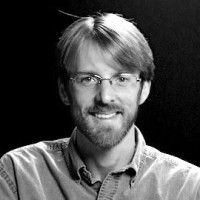TORONTO, ON (12 Sept. 2014) – Among the speakers at this year’s TEDxToronto conference is Prof. Keith Vanderlinde of the University of Toronto’s Dunlap Institute for Astronomy & Astrophysics and the Department of Astronomy & Astrophysics.
 Vanderlinde is an experimental cosmologist who studies the nature and evolution of large-scale structure in the Universe, as well as the evolution of the cosmos itself.
Vanderlinde is an experimental cosmologist who studies the nature and evolution of large-scale structure in the Universe, as well as the evolution of the cosmos itself.
In pursuit of his research, he uses specialized instruments such as the South Pole Telescope, and has even spent ten months working in the Antarctic.
He is also a member of the Very Long Baseline Interferometry team making observations with the Algonquin Radio Observatory in northern Ontario and the Giant Metrewave Radio Telescope in India.
And he is a member of a cross-Canada collaboration building an innovative, digital radio telescope near Penticton, B.C. The Canadian Hydrogen Intensity Mapping Experiment, or CHIME, is a radio array that will create a three-dimensional map of the largest volume of the Universe ever.
Before arriving at the Dunlap Institute, Vanderlinde was a CIfAR Junior Fellow, a McGill Trottier Fellow at the McGill Cosmology Instrumentation Lab, and received his PhD from the University of Chicago.
Along with Canadian Olympian Adam van Koeverden, Toronto Star publisher John Cruikshank, Dr. Margot Taylor from the Hospital for Sick Children, and many other distinguished TEDxToronto speakers, Vanderlinde will explore the conference theme: Relentless Pursuits.
TEDx events are independently-organized TED events and TEDxToronto is Canada’s largest TEDx event. In addition to the annual, one-day conference, TEDxToronto runs community programming throughout the year exploring issues of local relevance.
-30-
The Dunlap Institute for Astronomy & Astrophysics, University of Toronto, continues the legacy of the David Dunlap Observatory by developing innovative astronomical instrumentation, including for the largest, most advanced telescopes in the world; by training the next generation of astronomers; and by fostering public engagement in science. The research of its faculty and postdoctoral fellows includes the discovery and characterization of exoplanets, the formation of stars, galactic nuclei, the evolution and nature of galaxies, the early Universe and the Cosmic Microwave Background, and the Search for Extra-terrestrial Intelligence (SETI). Together, the Dunlap Institute, the University of Toronto’s Department of Astronomy & Astrophysics, and the Canadian Institute for Theoretical Astrophysics comprise the leading centre for astronomical research in Canada.
###
